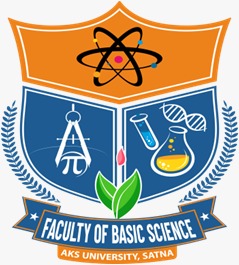Department of Mathematics
About the Department
Vision
Mission
HOD's Desk
Graduate Attributes (GA)
About the Department
Overview of the Department
The Department of Mathematics was established in the academic year 2017. Department of Mathematics is a diverse and vibrant academic unit, of AKS University, consisting of expertise in Mathematics that offers a wide variety of courses and degree options in Mathematics and Applied Mathematics at the Bachelors, Masters, and Ph.D. levels. Department of Mathematics is engaged in outstanding research in Pure and Applied Mathematics.
Department has striven to set high standards of teaching. The Department has succeeded in this endeavour and over the years, it has produced highly qualified and motivated Mathematicians and statistician to provide leadership in Educational institutions, R&D organizations and Software Industry. Graduates of this department are distinctively placed in reputed institutions and organizations. It has been the cherished goal of the department to inculcate in the students a desire to excel, to demonstrate originality and to develop a sense of responsibility towards the society. Accordingly, the Department continuously reviews and monitors the curriculum of its academic programs.
Department has striven to set high standards of teaching. The Department has succeeded in this endeavour and over the years, it has produced highly qualified and motivated Mathematicians and statistician to provide leadership in Educational institutions, R&D organizations and Software Industry. Graduates of this department are distinctively placed in reputed institutions and organizations. It has been the cherished goal of the department to inculcate in the students a desire to excel, to demonstrate originality and to develop a sense of responsibility towards the society. Accordingly, the Department continuously reviews and monitors the curriculum of its academic programs.
Glimpses of the Mathematics Department
Strength
More than
100
students

Faculty & Staff
10
Experienced, Skilled & Research Oriented Faculties & Staff

Program Offered
- B.Sc. – 4 Year Degree (Honors/by Research)
- M.Sc. in Mathematics
- Ph.D. in Mathematics

For Research innovation and skill development
- MATLAB
- Latex Software
- National Digital Library
- High Impact Publications

Vision
Vision
Imparting the quality of Mathematics education and inculcating education of the spirit of research through innovative teaching and research methodologies.

Mission
Mission
M-1: To provide an environment where student can learn, become competent users of Mathematics and understand the use of Mathematics in other disciplines.
M-2: To produce post graduate students with strong foundation to join research or to serve industry.
M-3: To provide the best possible facilities for our students, particularly in the area of computer facilities, library facilities and administrative support.
M-4: To strive by introducing the students to main ideas and methods of Mathematics for building up their reasoning and analytical skills.
M-2: To produce post graduate students with strong foundation to join research or to serve industry.
M-3: To provide the best possible facilities for our students, particularly in the area of computer facilities, library facilities and administrative support.
M-4: To strive by introducing the students to main ideas and methods of Mathematics for building up their reasoning and analytical skills.
HOD's Desk
Dr. Sudha Agrawal
Associate Professor & Head Department of MathematicsAKS University, Satna (M.P.) India – 485001

Message
Mathematics is a gateway to a wide range of career opportunities across diverse fields such as engineering, software companies, multinational corporations (technical and IT wings), IT firms, banks, consultancies, educational institutions, government departments, and research organizations. Career roles may include software engineer, software developer, system administrator, IT officer, consultant, academician, and researcher, among many others.The scientific and analytical skills acquired through the study of mathematics open doors to numerous possibilities in both academic and industrial domains. Advancements in mathematics are vital for progress in areas such as software development, artificial intelligence, data analytics, and emerging technologies. The Department of Mathematics at AKS University offers a range of academic programs including B.Sc., B.Sc. (Hons), M.Sc., and Ph.D. These programs are designed in alignment with the National Education Policy (NEP) 2020 and aim to foster scientific learning and innovation. The department is committed to nurturing students into responsible individuals who are capable of creating, collaborating, and contributing to the betterment of society through their mathematical acumen. Our department emphasizes holistic student development by imparting multi-dimensional skills essential for research, innovation, and higher education. We strive to equip our students with the tools necessary to build secure and successful careers as researchers, academicians, or professionals in the software industry.
To achieve these goals, we have a team of dedicated and highly qualified faculty members who are actively engaged in fostering a research-oriented mindset, critical thinking, and curiosity among students. Beyond academics, students are encouraged to participate in various co-curricular and extra-curricular activities and are sensitized to their social responsibilities. Overall, our objective is to develop students who possess strong ethics, knowledge, skills, enthusiasm, and determination—enabling them to thrive in their careers and contribute meaningfully to society.
To achieve these goals, we have a team of dedicated and highly qualified faculty members who are actively engaged in fostering a research-oriented mindset, critical thinking, and curiosity among students. Beyond academics, students are encouraged to participate in various co-curricular and extra-curricular activities and are sensitized to their social responsibilities. Overall, our objective is to develop students who possess strong ethics, knowledge, skills, enthusiasm, and determination—enabling them to thrive in their careers and contribute meaningfully to society.
Graduate Attributes (GA)
Graduate Attributes (GA)
The Graduate Attributes encompass the information, abilities, and attitudes possessed by students upon graduation. These properties are universal and applicable to all programs.
1. Technical Knowledge: Utilize expertise in mathematics, science, engineering principles, and a specific specialization to discern answers for intricate life science-related problems.
2. Problem Findings: Identify, create, assess, and analyse intricate mathematical issues, arriving at well-founded conclusions through a multidisciplinary approach.
3. Skill Development: Devise solutions for intricate issues and create system components or processes that fulfil defined requirements, while appropriately addressing public upliftment of society with technology, as well as cultural, sociological, utilizing both core and soft skills.
4. Research Oriented Learning: Employ empirical knowledge and methodologies, data analysis and interpretation, and information synthesis, to derive valid results.
5. Technical Development: Develop, choose, and implement suitable methodologies, software, resources, including predictive analytics and modelling, for intricate tasks while recognizing their limitations.
6. Contribution in Society: Development Utilize contextual knowledge to evaluate societal, learning software and applying in problem challenges, along with the associated obligations pertinent to professional activity.
7.Project and Practical Skills: Demonstrate knowledge and understanding of the mathematics principles and apply these to one’s own work, as a member and leader in a team, to manage projects and in multidisciplinary.
8. Life-long Learning: Recognize the need for, and have the preparation and ability to engage in independent and life-long learning in the broadest context of technological change.
1. Technical Knowledge: Utilize expertise in mathematics, science, engineering principles, and a specific specialization to discern answers for intricate life science-related problems.
2. Problem Findings: Identify, create, assess, and analyse intricate mathematical issues, arriving at well-founded conclusions through a multidisciplinary approach.
3. Skill Development: Devise solutions for intricate issues and create system components or processes that fulfil defined requirements, while appropriately addressing public upliftment of society with technology, as well as cultural, sociological, utilizing both core and soft skills.
4. Research Oriented Learning: Employ empirical knowledge and methodologies, data analysis and interpretation, and information synthesis, to derive valid results.
5. Technical Development: Develop, choose, and implement suitable methodologies, software, resources, including predictive analytics and modelling, for intricate tasks while recognizing their limitations.
6. Contribution in Society: Development Utilize contextual knowledge to evaluate societal, learning software and applying in problem challenges, along with the associated obligations pertinent to professional activity.
7.Project and Practical Skills: Demonstrate knowledge and understanding of the mathematics principles and apply these to one’s own work, as a member and leader in a team, to manage projects and in multidisciplinary.
8. Life-long Learning: Recognize the need for, and have the preparation and ability to engage in independent and life-long learning in the broadest context of technological change.

